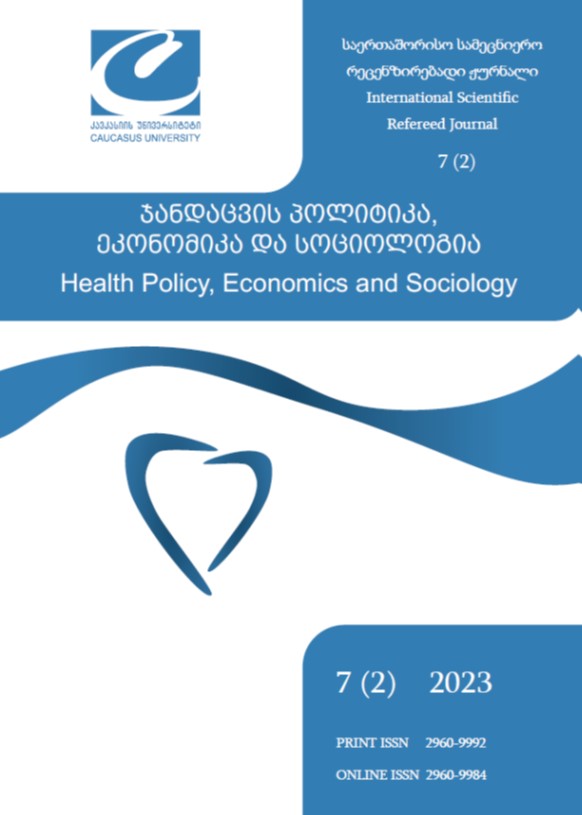სამედიცინო პერსონალის მოტივაციური და დემოტივაციური ფაქტორები
DOI:
https://doi.org/10.52340/healthecosoc.2023.07.02.05საკვანძო სიტყვები:
დემოტივაციის პრევენცია, სამოტივაციო სქემები, დემოტივაცია, მოტივაციაანოტაცია
შესავალი: სამედიცინო დაწესებულებებში საქმიანობის ეფექტურად სრულყოფისთვის საჭიროა მოტივირებული, შედეგზე ორიენტირებული, პასუხისმგებლიანი ადამიანური რესურსები. ამისათვის, ორგანიზაციებს უნდა ჰქონდეთ, ეფექტური სამოტივაციო და დემოტივაციური ფაქტორების აღმოფხვრის მექანიზმები. თანამედროვე მენეჯმენტში პერსონალის მოტივაცია საშუალებას გვაძლევს ოპტიმალურად გამოვიყენოთ შრომითი რესურსი. კვლევის მიზანია საქართველოში სამედიცინო პერსონალის მოტივაციისა და დემოტივაციის ფაქტორების განსაზღვრა. მეთოდი: გამოყენებულ იქნა რაოდენობრივი და თვისობრივი მეთოდები. რაოდენობრივი კვლევის საშუალებით გამოკითხულ იქნა 146 სამედიცინო პერსონალი. თვისობრივი კვლევის მეთოდით ჩატარდა 6 ექსპერტის სიღრმისეული ინტერვიუ. შედეგები, დისკუსია: თანამშრომლებისა და მენეჯმენტის დამოკიდებულებებს შორის კორელაცია დაბალია, მენეჯმენტი არ ფლობს სრულ და ფასეულ ინფორმაციას თანამშრომელთა ინდივიდუალურ საჭიროებებზე, არსებულ დემოტივატორ ფაქტორებსა და სასურველ მოტივატორ ფაქტორებზე. მიუხედავად ექსპერტების სრული და ყოვლისმომცველი უკუკავშრისა, თანამშრომლებს ბევრად მეტი საჭიროება და პრობლემა აქვთ სამუშაო სივრცეში, ვიდრე მენეჯმენტი აღიქვამს. სამედიცინო ორგანიზაციებში არსებული სამოტივაციო მექანიზმების დიდი წილი მატერიალურ მოტივატორ ფაქტორებს უჭირავს, რის ფონზეც არამატერიალური მოტივატორი, რაც ნამდვილად ღირებულია თანამშრომელთა შრომითი ეფექტურობისთვის, არ არის წინა პლანზე წამოწეული. დასკვნა: რეკომენდირებულია სამედიცინო დაწესებულების თანამშრომელთა მოტივაციის სისტემის შექმნა, მოტივაციის მასტიმულირებელი ფაქტორების გამოვლენა და მათი გამოყენება, არაპირდაპირი მოტივაციის სისტემის გაძლიერება.
წყაროები
• გურგენაშვილი, გ. (2021). მოტივაციის სისტემების გამოყენება საერთაშორისო ბიზნესში. გორის სახელმწიფო სასწავლო უნივერსიტეტი.
https://openscience.ge/bitstream/1/2776/1/Giorgi%20Gurgenashvili%20Samagistro.pdf?cv=1 ნანახია 04.05.2023
• სიჭინავა, ა. (2019). თანამშრომელთა სამოტივაციო სქემების განვითარება საქართველოს საჯარო სტრუქტურებში. საქართველოს საჯარო სამსახურის ბიურო.
• Burgt, S., Kusurkar, R., Croiset, G., Peerdeman, S. (2018). Exploring the situational motivation of medical specialists: a qualitative study. International Journal Of Medical Education. 26; 9:57-63.
• Daneshkohan, A., Zarei, E., Mansouri, T., Maajani, Kh., Ghasemi, M., Rezaeian, M. (2015). Factors affecting job motivation among health workers: A study from Iran- Global Journal of Health Science, 7(3):153-160.
• Dieleman, M., Toonen, J., Touré, H. et al. (2006). The match between motivation and performance management of health sector workers in Mali. Hum Resour Health 4, 2.
• Franco, L.M., Bennett, S., Kanfer, R. (2002). Health sector reform and public sector health worker motivation: a conceptual framework. Soc Sci Med. 54(8):1255-66.
• Jaskiewicz, W., Deussom, R., Wurts, L., & Mgomella, G.S. (2014). Rapid retention survey toolkit: Designing evidence-based incentives for health workers. Revised.
• Lea, D., Aquinoa, P., Jalagat, R., Trucc, N., Sid, Le., Mye, Le. (2021). Factors affecting employees’ motivation - Management Science Letters, 11(4):1063-1442.
• Malik, M., Wan, D., Dar, L., Akbar, A., & Naseem, M. A. (2014). The Role Of Work Life Balance In Job Satisfaction And Job Benefit. Journal of Applied Business Research (JABR), 30(6), 1627–1638.
• Mathauer, I. and Imhoff, I. (2006). Health Worker Motivation in Africa: The Role of Non-Financial Incentives and Human Resource Management Tools. Human Resources for Health, 4, 24.
• Najafi, S., Noruzy, A., Azar, H., Nazari-Shirkouhi, S., Dalvand, R. (2011). Investigating the relationship between organizational justice, psychological empowerment, job satisfaction, organizational commitment and organizational citizenship behavior: An empirical model. African Journal of Business Management. 5. 5241-5248.
• Peters, M.L., Flink, I.K., Boersma, K., Linton, S.J. (2010). Manipulating optimism: Can imagining a best possible self be used to increase positive future expectancies? The Journal of Positive Psychology, 5:3, 204-211.
• Songstad, N.G., Rekdal, O.B., Massay, D.A. et al. (2011). Perceived unfairness in working conditions: The case of public health services in Tanzania. BMC Health Serv Res, 11, 34.
• Szabo, S., Mihalčová, B., Lukáč, J., Gallo, P., Čabinová, V., Vajdová, I. (2020). Demotivation of Medical Staff in the Selected Health Facility in Slovakia. Economics and Management, 23(2): 83–95.
• Tino, M., Magawa, R. (2013). Retaining doctors in rural Zambia: A policy issue.
• World Health Organization. (2006). The world health report : 2006 : working together for health. World Health Organization.
ჩამოტვირთვები
გამოქვეყნებული
როგორ უნდა ციტირება
გამოცემა
სექცია
ლიცენზია

ეს ნამუშევარი ლიცენზირებულია Creative Commons Attribution-ShareAlike 4.0 საერთაშორისო ლიცენზიით .













